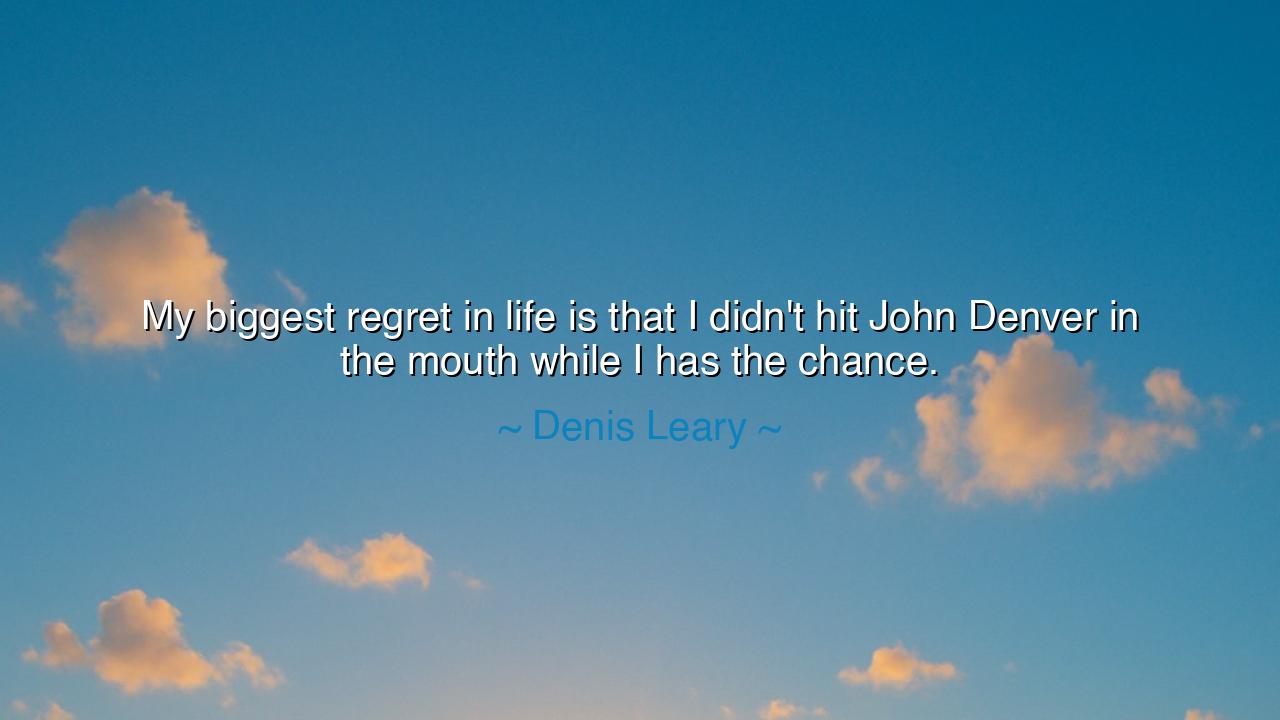
My biggest regret in life is that I didn't hit John Denver in the
My biggest regret in life is that I didn't hit John Denver in the mouth while I has the chance.






In the heart of human existence, there is a deep, sometimes unspoken tension between action and regret. The words of Denis Leary, “My biggest regret in life is that I didn't hit John Denver in the mouth while I had the chance,” are not to be taken literally, but instead reveal a profound truth about the human condition: that our greatest regrets often stem from the moments when we fail to act, when we let opportunities slip away, or when we hold back out of hesitation. In this bold, comedic statement, Leary is not lamenting a missed chance for violence, but rather reflecting on the frustration that arises from missed opportunities and the lingering dissatisfaction that follows.
The ancient philosophers were well aware of this tension between action and inaction. Aristotle, in his Nicomachean Ethics, teaches that virtue lies not just in doing good, but in doing what is right at the right time. He emphasizes the importance of courage — not the courage to face death in battle, but the courage to act in the moments when it counts, to seize the opportunities that life offers without hesitation. For Aristotle, those who fail to act in moments of opportunity, who let fear or doubt govern their decisions, live lives marked by regret and lost potential. Leary’s words capture this ancient wisdom, albeit with a modern, comedic edge — the regret of not having acted when the moment was ripe, and the lingering frustration of what could have been.
This human experience of regret, of missed chances, is a theme that runs throughout history. Consider the tragic tale of Julius Caesar, whose assassination on the Ides of March came not just as a consequence of political intrigue, but as a result of his own failure to recognize the impending danger. Caesar, at the height of his power, had multiple warnings of the conspiracy against him, yet he failed to act decisively. In this moment of inaction, Caesar’s regret — had he been able to see the future — might have been that he didn’t strike first, that he didn’t take action when the signs were clear. Like Leary, who reflects on the opportunity to act against Denver, Caesar’s greatest regret lies in what he failed to do when the time for action was upon him.
Similarly, the story of Hercules in Greek mythology teaches us the value of acting with boldness. Hercules, a hero known for his incredible feats, was faced with the impossible task of completing the twelve labors, each more dangerous than the last. But in the face of overwhelming odds, Hercules did not hesitate. He did not look back or second-guess his decisions — his actions were driven by resolve and the understanding that inaction would only lead to failure. His example serves as a reminder that hesitation in the face of opportunity can lead to regret, and that acting decisively is often the difference between victory and loss. In this, Hercules embodies the ancient ideal that courage is not just about facing danger, but about seizing opportunity when it arises.
Leary’s reflection speaks to a deeper truth in human experience: that action is required in order to avoid the deep dissatisfaction of regret. Life, in its fullest sense, is a series of choices — choices to act boldly or to withdraw in fear. The consequences of these choices, especially in those moments of decision, echo through time, creating stories of triumph or missed opportunities. Consider the example of Nelson Mandela, who, when given the opportunity to lead South Africa, did not hesitate to act, despite the risks to his life. His decision to stand against apartheid was not just about his own sense of justice, but about his ability to seize the moment, to make history, and to ensure that the voices of the oppressed were heard. Mandela’s bravery is a clear example of acting when the moment is right — a powerful contrast to the regret of those who hold back.
The lesson in Leary’s words is clear: action, when the time is right, is essential to avoiding the regret that comes from inaction. It teaches us that while it is easy to stay in the safe confines of fear or doubt, it is only through boldness that we create the possibility for growth and achievement. Regret is not found in what we fail to accomplish, but in what we fail to try. Like Hercules or Mandela, we must look at each moment as an opportunity to take action, to seize the day, and to know that, even in failure, there is honor in the effort. For it is often those who act decisively, who put themselves in harm's way to change the course of their own lives or the world, who are remembered not for their successes, but for their courage.
In our own lives, we are faced with countless opportunities to act, to move beyond our fears, and to seize the moment. Let us not be those who hesitate, who wonder “what if” after the chance has passed. Instead, let us embrace the wisdom of bold action, of choosing decisively when the time calls for it. Let us act with the knowledge that even in failure, there is no regret, for we have at least tried. As Denis Leary reflects, in the grand theater of life, it is not about what you wish you had done, but what you dare to do when the chance presents itself. Let us live fully, with courage, and know that our actions define us far more than our moments of hesitation.






AAdministratorAdministrator
Welcome, honored guests. Please leave a comment, we will respond soon